For most people around the world, leaving behind four wheels for two means having fun, saving a little money, and maybe slicing through a congested city. No matter if you like long-distance big cruisers or wheelie-happy mini-motorcycles, there’s something for everyone. But there’s one motorcycle that is so bad at just everything that there might not be a reason to bother looking for it. This is the Amazonas 1600, a Brazilian police bike that’s ridiculously heavy, hilariously slow, and comically goofy thanks to an engine that was ripped right out of a Volkswagen Beetle.
I stumbled upon one of these bikes while searching for Royal Enfield Diesels to import and it’s taken me down a rabbit hole. I feel like I can say something good about pretty much every car and motorcycle in existence. The Yugo was a bargain and a Harley-Davidson Freewheeler allows someone to keep riding long after they’ve lost their balance. I’d even happily take a Mitsubishi Mirage when I go to the Florida RV SuperShow in January.
In the past, I would have even said there’s no such thing as a bad car or motorcycle. Then VinFast came around. Now, the Amazonas 1600 is here to suggest that my optimism might be misplaced. I mean, does 900 pounds, up to 50 HP, and a girth that would make an oil tanker blush sound appealing to you?
Bare Necessities
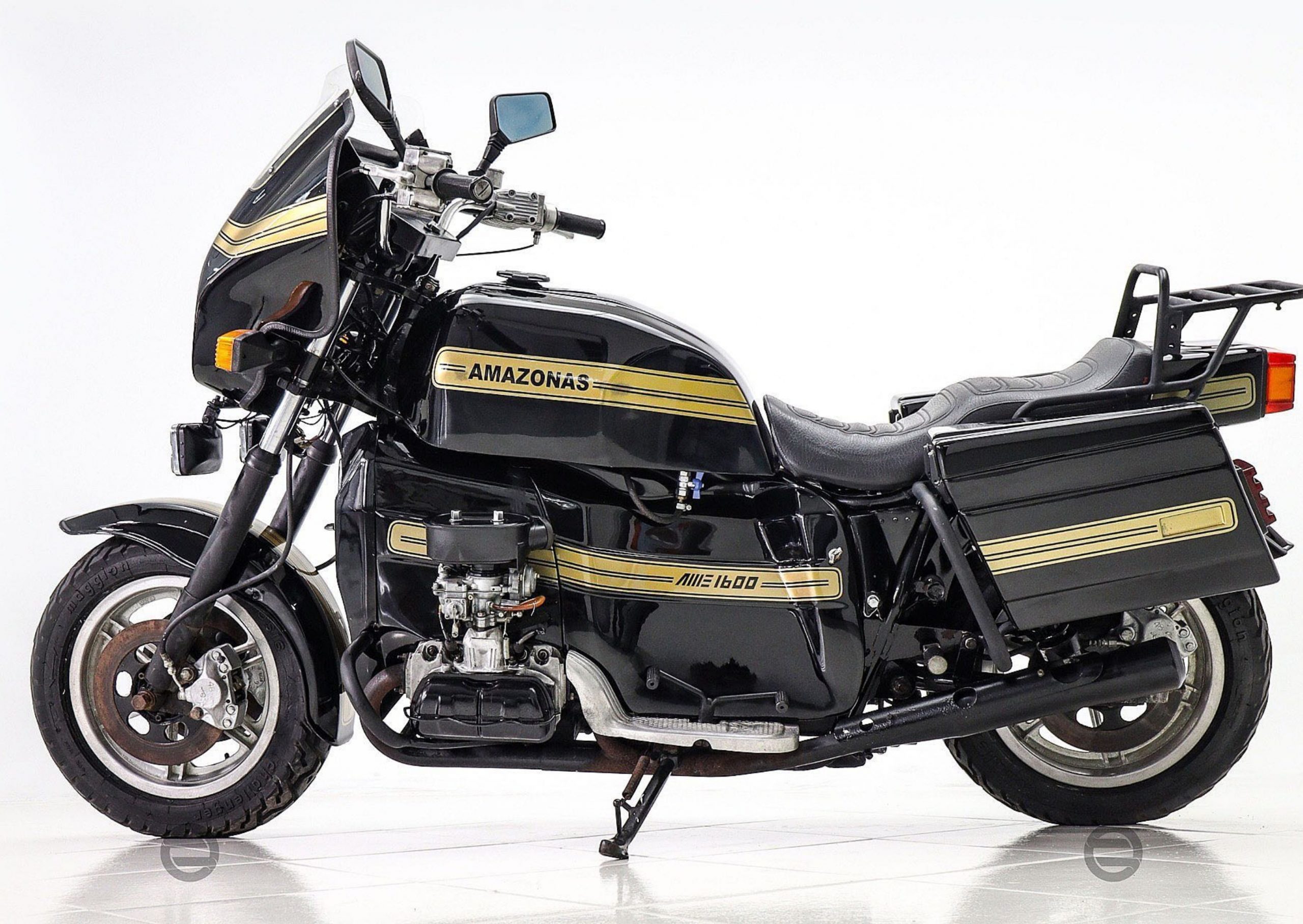
As terrible as this motorcycle sounds, how it came to be makes a lot of sense. The bikes have even managed to become somewhat famous, but not for how they ride.
As Cycle World wrote in 1985, the Amazonas 1600 was born out of necessity. It was the late 1970s and Brazil was trying to recover from economic turmoil. In the years before, the country tried to pump up the local economy by halting imports. Unfortunately, this didn’t have the intended effect. Brazil thought that the embargo would allow its industries, including the motorcycle industry, to flourish. Instead, the bikes in the country became old, broken-down machines as a proper motorcycle industry failed to materialize.
This became a problem for the country’s civilian and military police officers. Eventually, they found themselves riding over two-decade-old Harley-Davidsons that were literally falling apart. Making matters worse was the fact that due to the import restrictions, the police forces couldn’t get proper parts to fix them.
Then came Daniel Ferreira Rodriguez, an engineer and owner of an auto parts shop. He took note about the lack of domestic options for motorcycles and figured he could fill that giant hole. As it turns out, Jason wrote a little something about these bikes back in 2017, but G/O Media neutered his piece in the years since. Here’s an archived version to take a peek at.

In that piece, Jason describes that the original idea for combining a VW engine and a bike came from friends Luiz Antonio Gomi and José Carlos Biston in the late 1970s. See, Gomi loved Harleys, but he hated how they broke all of the time. Thus, the Amazonas was born, from a statement attributed to Gomi:
“…I had a Harley and a Beetle. Every time I got out of Harley, there were always small problems: You know how to break a chain, unload the battery, and so on…and whenever I went to the rescue, it was my [exhausting]. I THOUGHT, I’LL PLACE THE VW ENGINE ON [the] HARLEY…It never breaks!!!”
These new bikes were called Motovolks and they combined VW engines with over 20-year-old Indian and Harley-Davidson frames. They caught the attention of Rodriguez, who got the bright idea to put them into production to serve the police, also hoping that Brazilians would get into motorcycle touring.
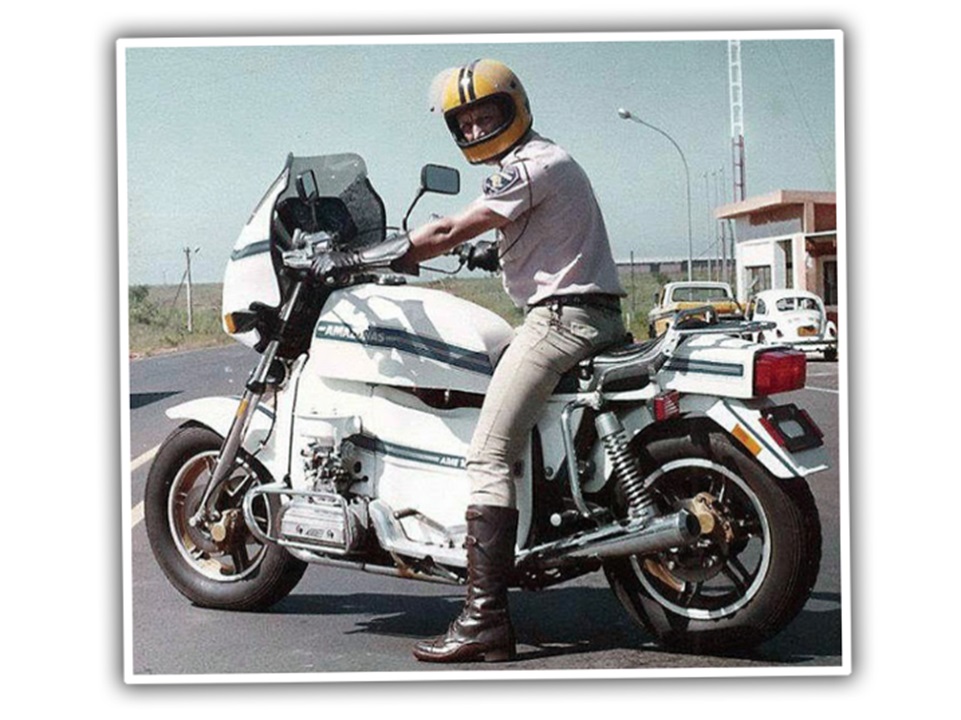
However, there were a few problems. Brazil’s economy was still in its trough, so there weren’t a ton of funds for proper engineering. Likewise, Rodriguez couldn’t import parts and a proper production bike couldn’t just have the frames of scrapped vintage Harleys. At the same time, Brazil didn’t have much of a big motorcycle industry, so he couldn’t just borrow proper motorcycle parts from another manufacturer. This put him in a tough spot.
What is a man to do with this lack of resources? Work with what he could find. For an engine, Rodriguez reached out to Volkswagen do Brasil, which was happy to send engines his way. Amazonas Motocicletas Especiais, Ltda, the company to sell these new machines, received VW 1300 and 1600 air-cooled flat fours, which according to the official spec sheet, bikers were looking at a whopping 50 HP at best. In case you were wondering, the Amazonas 1300 was just as heavy as the 1600 but had to get by with a ravenous 38 HP.

An engine is only part of the motorcycle puzzle and Rodriguez didn’t really have good solutions for the rest of it. Whoever was in charge of the chassis didn’t use any modern technology such as using the engine as a stressed member. Instead, a tube frame was constructed from steel and it was reportedly ridiculously crude and ill-suited for a motorcycle, but apparently it was strong.
Everything else was similarly clunky and crude. The bike had disc brakes borrowed from a VW Karmann Ghia, a brake master cylinder from the donor VW adapted to the bike’s handlebars, brake calipers from a Brazilian Ford, and the four-speed manual transmission was ripped straight from VW Bugs as well. That meant this bike had a reverse gear and it needed it, too, since it weighed 900 pounds before you put a rider on there. Of course, even that transmission was cobbled together. The team at Amazonas welded the differential and then welded a sprocket to a half shaft, driving a chunky chain that finally reached the rear wheel.
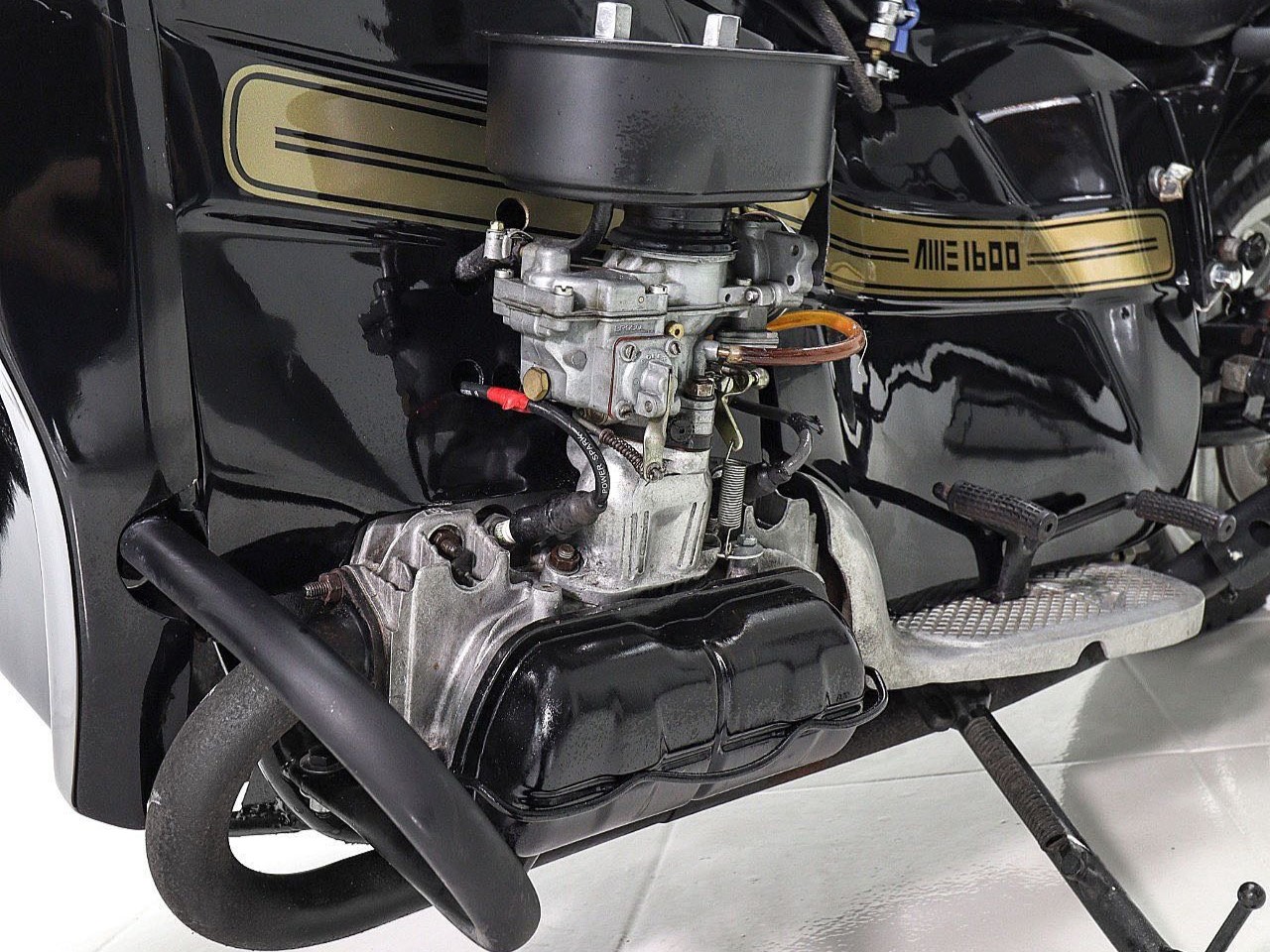
Rodriguez also designed the suspension and you wouldn’t be surprised to read that it, like the frame, was hilariously ill-suited for the titanic machine he created. The bike had a massive 48mm chrome-plated fork, which was so stiff that it didn’t actually respond to changes in the road surface. But if you did manage to hit something hard enough to compress the suspension, it jammed itself, anyway. Cycle World notes that the rear suspension has so little give that it might as well not be there. It’s like Rodriguez tried to install a truck suspension on a bike.
I’ll help you understand how absurd and huge this lad is. It’s as long as a Honda Gold Wing of the same year, but four inches wider and 300 pounds heavier while having about half of the power.
Even the tires were delightfully half-baked. The 20-man factory team couldn’t source motorcycle tires, so the Amazonas just wore really skinny 16-inch AME-branded car tires. All of this was ugly, and Rodriguez covered it up in fiberglass panels.

How did it ride? Well, I’ll just let Cycle World take the mic here:
The 50-hp version we sampled was barely able to out-accelerate a stock VW Beetle, despite weighing 1000 pounds less, and its top speed is a meager 91 mph. Of course, the horsepower deficiency is easily remedied with help from any number of aftermarket VW speed shops (see “Revenge of the Amazonas,” pg. 34).
Not so easily taken care of are the Amazonas’ handling abnormalities. At speeds below 15 mph, the bike steers with all the heaviness and imprecision of a `59 Plymouth Belvedere with a broken power-steering pump. Add to this an awkward, 31inch seat height and a torque-reaction twitch that makes a BMW’s seem insignificant by comparison, and you’ve got the makings of some inter esting moments during first-gear maneuvers. As speeds increase, the bike becomes much more stable, al though-due tothe bike’s extremely low center of gravity and a profile that is greatly affected by sidewinds it does tend to wander slightly.
[…]
Things are less reassuring when the Amazonas is pushed hard along a twisting road. The bike really doesn’t like to bend its way around a corner at anything faster than a pure sight seeing pace: and used hard, the brakes-lifted from a VW Karmann Ghia-fade quickly. Also conspiring to keep speeds down on backroads are the Amazonas’ suspension components, which can best be described as primitive.
Cycle World nominated the motorcycle for its list of “The Ten Worst Motorcycles” before any of its journalists got to ride one. The publication joked “There’s no justification for a bike so big that, whenever it passes a bus stop. everyone stands up and digs for change.” Sadly, getting to ride one didn’t result in the magazine thinking of the machine very highly.
The Silver Lining

All of this sounds amusing, but something good did come out of the Amazonas 1300 and the Amazonas 1600. The motorcycles went onto the market in 1977, with police forces scooping them up as quickly as possible. Then, something sort of magical happened.
In police hands, it was discovered that the Amazonas bikes, while not particularly thrilling, were practically bulletproof. Remember, these were basically VW Beetles with two wheels chopped off. The Amazonas motorcycles just kept on going and going. These bikes ran on the poorest quality gas and when their VW parts broke, riders were able to competently fix them using whatever they had lying around. Remember, these bikes more or less had the quality of a shed build but from the factory. Also, that stupid hard suspension? As it turned out, the Amazonas quickly proved itself to survive the country’s rough roads.

Over time, Cycle World writes, the Amazonas 1300 and 1600 became the dominant police bike in Brazil with the highest mileage examples surpassing 250,000 miles, albeit with some engine swaps. In a way, Cycle World writes, Amazonas almost put itself out of business. The cop bikes were so reliable and so durable that Amazonas didn’t have many return customers. Brazil also didn’t have a huge number of civilians who wanted to buy a 900-pound bruiser, so Amazonas looked to expand into other markets.
One of those markets was the United States. The company had the ability to make 1,000 motorcycles a year and figured a couple hundred of those could be diverted to the States. Of course, we were now deep into heavy emissions regulation by that point and Amazonas knew there was no chance it could get its engines past the EPA. So, the plan was to sell the bike to Americans as three different kits where you supplied the engine.
Amazonas figured it would sell a Phase I kit for $1,500, which would have included a frame and suspension. Toss another $1,500 in there and Amazonas would have given you the fiberglass bits, the gauges, and other mechanical pieces. Finally, for $4,500 Amazonas was willing to sell you a complete and finished bike that just needed a VW engine. An additional police variant was offered for $5,500. Back in 1985, Cycle World found that a used VW engine was about $300 while one souped up to 100 HP was $650. All-in, you’d have a touring bike for well less than the cost of a Honda Gold Wing, but none of its refinement and about 300 pounds more weight.
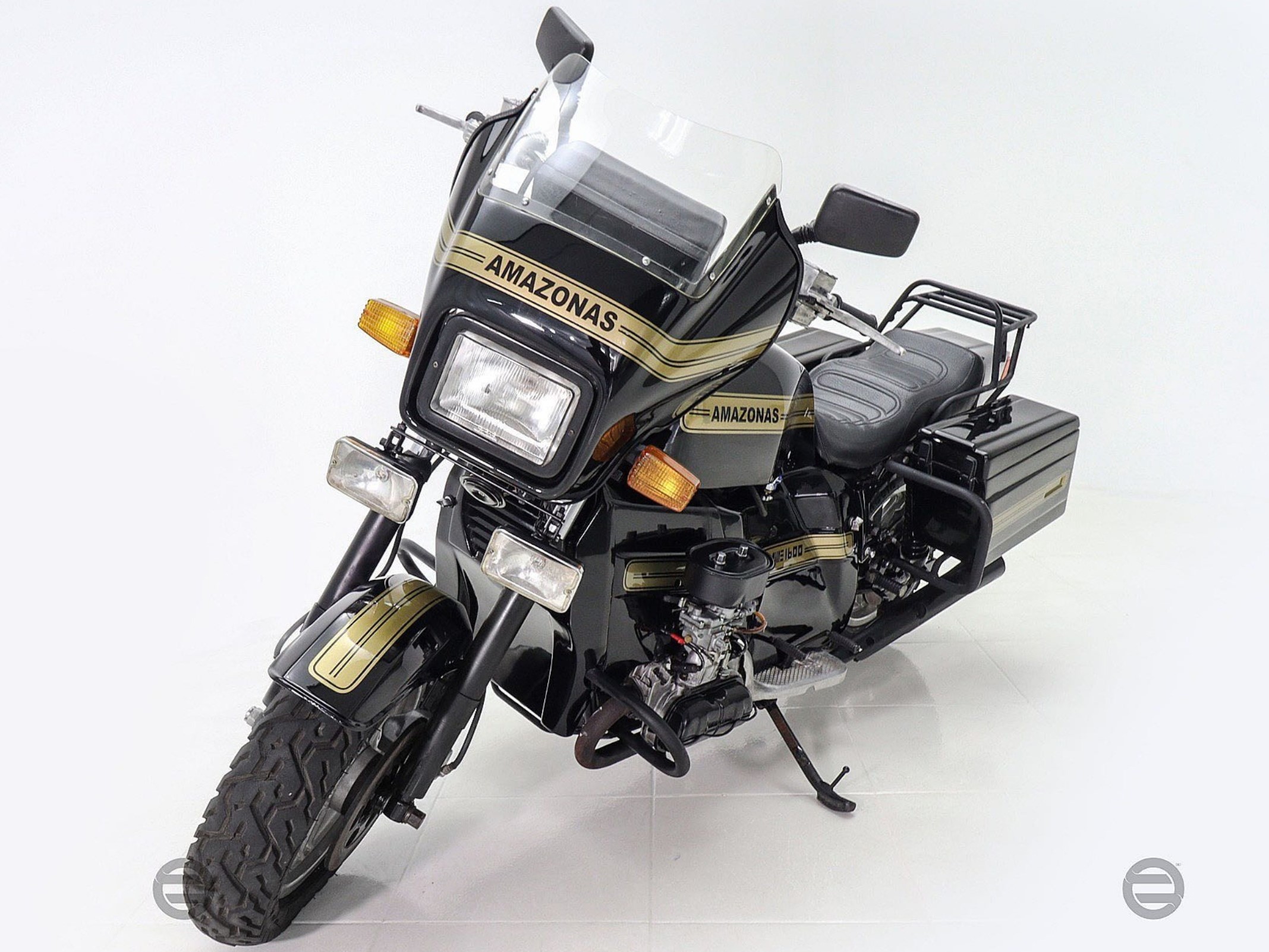
Unfortunately, it’s not known how many Amazonas motorcycles made it to America outside of the ones shipped to the country as part of its U.S. marketing effort. Further, it’s believed that Amazonas may have built somewhere around just 450 motorcycles before going belly-up after the Brazilian economy crashed in 1989.
Reportedly, the Amazonas design was sold to TECPAMA and production limped a little further into the mid-1990s. TECPAMA also improved on the Amazonas with new, actual motorcycle parts and bodywork, but still equipped with old VW engines, but now tuned to a hair-raising 64 HP. This new one was called the Kahena 1600. It’s unknown how many were ever built, but here’s one that was for sale on Brazil’s equivalent of Craigslist:
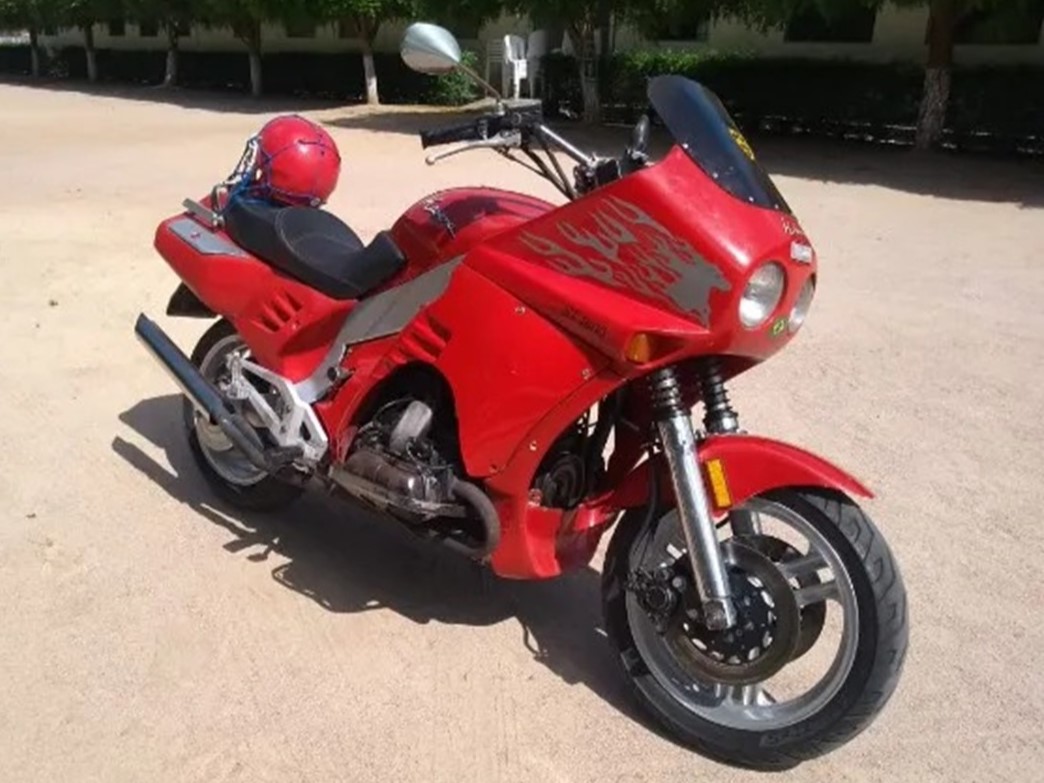
What’s amazing is that despite the Amazonas 1600 having the reputation of being possibly one of the worst motorcycles built, it has a bit of a cult following. Brazilians keep these bikes going even today and some of them have been found in the United States and the United Kingdom.
On paper, the Amazonas 1600 might be one of the worst motorcycles in the world. I mean, it’s 1,000 pounds lighter than a VW Beetle, yet it’s barely faster than the Bug despite using the same engine. That’s impressive. Also impressive is the horrid suspension and the massive girth. Yet, in making something that’s such a bad motorcycle, it seems Amazonas somehow made something endearing, too. So, maybe there is a such thing as a bad motorcycle, but that’s not necessarily a bad thing.


Reminds me of the Munch Mammoth.. Same time frame, oddly a German connection too.
https://silodrome.com/munch-mammoth-motorcycle/
Hitler’s children hiding in plain sight in Brazil.
They should make a movie about that.
Using a beetle engine in a motorcycle doesn’t sound like a terrible idea, but I guess the devil is in the execution.
So, even worse than the Boss Hoss? https://bosshoss.com/
Putting a VW engine into a motorcycle is (relatively) common; specifically using a BMW motorcycle as the basis of the machine, and a few adapters. If anyone’s interested, I found such a frame recently in Michigan on Facebook marketplace…
The hp isn’t terrible so was it the transmission that didn’t allow decent acceleration? My 98 Electra Glide with a 1340 is only rated for 67 hp but it’ll get out of it’s own way ok. Or was it just still so heavy with all the janky added structure?
They were using a stock carburetor, but two of them. The bikes are not that slow, and ride better than described here, I met the owner of one many years ago…
You know what I like about this site? I only need to read the title of the article to know who wrote the piece. This one threw me at first, so I had to stop and figure out if it was Torch or Mercedes. In the end Mercedes won out, as her screwy motorcycle vibe ultimately triumphed over Torch’s weirdo VW energy.
Now, if it featured vehicular repair chaos, that would have been David, hands down.
Not enough black for it to be Adrian…
Amazing how many sins some fiberglass panels and tape stripes can obscure visually
They should have offered it with a cargo sidecar. That’d help alleviate concerns about “what if it falls over”, and have real utility. Might also have helped with crosswinds.
And circle back three-quarters, to VW powered trike.
I didn’t grasp the absolute unit-ness of this unit until the picture of the cop astride one. Good lord that’s some heft to side astride. I want to ride one really badly. Not own it, just try it out.
To be fair, Brazilians are not a tall people, it looks to scale of the wheels so doesn’t seem like Boss Hoss sized.
If you want to do some further research, Gary at Midwest Sidecars in Sibley, Iowa has a running Amazonas and of course it’s married to a sidecar. Gary was also the late great Motorvation Sidecar’s longest serving employee and a font of sidecar history.
Reliability is it’s own special virtue and often worth your life. Just ask WWII tank crews, but not the German ones, as reliability really let them down and thus made the crews a scarce commodity.
Time for a flashback (courtesy Janet Jackson, and Lisa Lisa & Cult Jam, who remade it for the TV series):
Hey! Who’s there thinking Nasty thoughts? [Nasty boys!]
Who’s that riding that Nasty bike? [Nasty boys!]
Who’s that wearing that Nasty suit? [Nasty boys!]
Who’s got a Nasty attitude? [Nasty boys!]
Ladies? [Nasty~y~y bikes…] –Don’t mean a thing!
I still listen to Lisa Lisa & Cult Jam on a semi-regular basis. First, Lost in Emotion, second, I Wonder If I take You Home, third, Head to Toe, and finally, Little Jackie Wants to Be a Star (a song with really excellent production quality). Great stuff.
Shit! Now I have to go watch House Party.
My uncle, back when he rode, had a Gold Wing of early the 2000’s I believe. He used to put a car tire on the back as he used it for cruising only and wasn’t carving anything at any speed. I remember asking him about that and he said it road so much better down the road when said road was mostly straight but got a little sketchy if you tried to push it much through the twists.
I am not and have not been a bike rider, so not sure if this is common or even considered acceptable. Just hearing this thing used car tires made me think of my uncle
It’s a practice called “dark siding” and it’s somewhat common among long-distance riders. At the very least, I’ve definitely seen it a lot. I also tested it myself using a Suzuki Burgman 650 scooter. Car tires last much longer than motorcycle tires, which is alluring if you put tens of thousands of miles on your bike each year. You can also find car tires for much cheaper than a good moto tire.
However, I had similar observations during my testing. The scoot was great in a straight line but the tire just didn’t stand up to cornering like a motorcycle tire does. I mean, a car tire is square on the bottom and when you’re cornering you’re riding on the shoulders and maybe the sidewall. Some car tires also don’t interface that well with motorcycle wheels, so you’re instantly screwed if you get a flat or break the bead. I determined it wasn’t worth the risk. It was an interesting experiment, but I’d rather just spend more and get a real moto tire.
That all totally makes sense. My uncle did a lot of highway miles and slow cruising. Wasn’t pushing things by any means. Being square I can see where the issue would come in with needing to lean the bike over. I probably wouldn’t take the risk either but if I was putting a ton of miles on a bike but not carving anything up, I can see the allure.
A friend of mine dark sided his bike and I rode it a few times. It was certainly rideable but man I really didn’t like it. Like you said straight line was fine but to turn I really had to think about it and sometimes throw my hips into it just to get it up on the shoulder of the tire. No way I’d do that to a bike I owned, I’d rather just replace regular motorcycle tires than get 10K miles out of a square car tire.
Like a snow tire, it is not just the shape of the tire that matters. Yes, a softer compound doesn’t last as long. And that is a good thing.
There were better car engined motorcycles. The French BFG used a Citroën GSA engine and and contemporary motorcycle suspension. It was motivated morw by nationalism than protectionism so BFG had access to imported parts. https://www.citroenet.org.uk/miscellaneous/bfg/bfg.htm
In Brazil by the 80s you could get a BMW GS knockoff made as side project by a company whose normal product was asbestos shingle machinery.
I remember an article about this bike when I was living on my R100 in the early 90’s. It was in the BMW Owners of America’s monthly magazine. I’ve done google searches for info about this (not recently) but came up empty handed. Was it called a BMC ?
I recalled it from the BMWMOA magazine, but would have to dig in the garage to find the article. Sadly the plan to digitize back issues foundered on copyright
So they don’t have back issues available on line? That’s a bummer. I have no idea what happened to mine, lost in a move probably. Do you remember the one about long rod ratios in R90’s for racing the Baja 1000? That one stuck with me so long that I bothered, some years back, to work out the math and make plots of piston position, speed, and acceleration vs. crank angle for different RLR values.
I do remember tech articles about “long rod” engines but my membership ship lapsed
“So, maybe there is a such thing as a bad motorcycle, but that’s not necessarily a bad thing.”
So a bad thing with a personality can be a good thing. (-;
I think I’d add one to my motorized things as a gift, but not actually try to find one.
My old knees tend to complain at bikes over 500lbs these days, but I could see making a deal with them once or twice a season. Classic plates, cheap insurance, the sale price would have to be very low (0$) to qualify for shed space at my house.
However I think it is the basic Autopian duty of everyone named Mercedes Streeter to acquire one of these and ride it coast to coast during a Summer.
Nope. She’s already got a lifetime of dental work scheduled.
So if enough new subscribers sign up will Mercedes buy one of these and live on it for a week? I mean, it sure sounds like a terrible vehicle but it’s even more interesting than the Aztek, to me.
I showed the photos to my wife, who lived in Brazil for a few years (a few decades ago) and her response was to recoil in terror. Apparently, it wasn’t uncommon in Sao Paulo for the police to ride those bikes on the sidewalks and she nearly got clipped by one more than once.
I have a neighbor who’s Brazilian. He was at the house one day checking out my brother-in-law’s Harley when I asked him about the Amazonas. He had a similar reaction to your wife, describing them as more or less a menace. He said they were OK in the hands of a skilled rider. The problem was that most Brazilian cops weren’t what you’d call skilled at much of anything.